The weather has been beautiful so far on our journey. The road was full of the great Sipahi, but nothing really happened worth relaying until we reached Ciorlu, where we lodged in a conac, or small seraglio. I did some serious exploring of all the women's apartments here, which are in the middle of a thick copse of trees, and found the walls to be covered with poetry, written by the women, little distiches penciled in by hand. 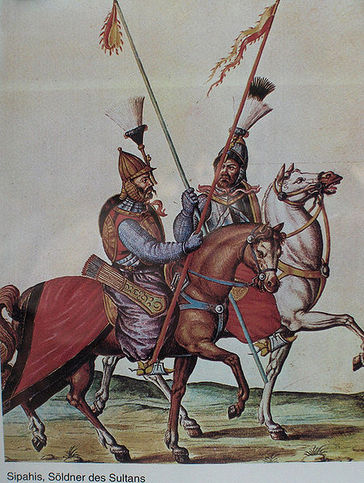 Sipahi at the Battle of Vienna, 1642 As we rode on we passed an ancient Greek church, which seemed pretty poorly built and less richly decorated than the Roman Catholic church, but the most celebrated Madonna in Italy could not be more famous for her miracles than this church!
We stayed that night at Bujuk Cekmege, or Great Bridge; and the next, at Kujuk Cekmege, or Little Bridge. We stayed in a former monastery that now belongs to a hogia or schoolmaster. I asked him to show me his own home, and he pointed to a treehouse he had built for himself and his family at the top of tall cypress! I wanted to take a closer look, but realized I'd probably break my neck on the climb.
Finally, we made it to Constantinople the next day; but I haven't had much time for exploring yet –I've had so many visits to make over the last few days. We are staying in Pera, (which is no more a suburb of Constantinople, than Westminster is a suburb to London). 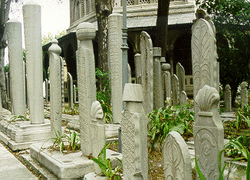 Cemetery on the grounds of the Cemetery on the grounds of the
Süleymaniye mosque A certain French author says, Constantinople is twice the size of Paris. Mr W—— is claims its no bigger than London, though it looks bigger to me, but maybe not quite a populated. The cemeteries themselves are larger than the entire city, I've seen some a few miles long. No graves are ever moved and so land the size of villages becomes devoted to burying the dead. For each grave a pillar is set up and a turban indicating the profession or position of the person is carved into the top. Women have a simple pillar with no carvings or decorations, except those that died unmarried who have a rose at the top of the pillar.
When I wrote earlier about religion, there were a few things I forgot to mention but I wanted to discuss now because they seemed a little unbelievable to me. First, did you know that when a man divorces his wife he can get her back (legally) by simply permitting her to sleep with another man? I know some people who actually choose to do this rather than loose their love entirely. Second, I've learned that a woman who dies unmarried is believed to die in a state of reprobation. As a woman's purpose is to create and multiply, she is only doing what God expects when she is having or taking care of children. Of course, our vulgar misconception that they believe women do not have souls if completely false, though women's souls are seen as inferior to men’s and unable to get into the same paradise reserved for them. There is a “place of happiness” dedicated entirely to the souls of the inferior where all good women may have eternal bliss. Many of the women are superstitious and are afraid to remain a widow for more a week for fear of dying in a useless state. Those that enjoy being free of a husband and are not as strict in their beliefs, just wait and marry when they start to become afraid of dying. This seems very different than the idea that nothing is more acceptable to God than a vow of constant virginity. I'll let you decide which is more traditional...
I can't tell you anything else yet, but once I've done some exploring, you'll hear from me!.
Welcome to my first post! I'm Lady Mary Wortley Montagu and I'm so excited to share my travels with all of you! Thank you for all of your emails and tweets! I'm in Belgrade now, about to set out to Adrianople and finally really begin my travels through Turkey!
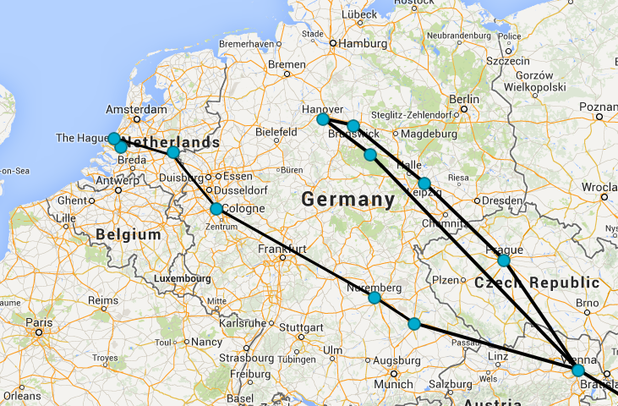 The first half of my trip around Europe! We stayed about 6 months before we headed on to Turkey! We first arrived in Rotterdam (see pics on twitter, @Lady_Mary_WM) and then traveled to The Hague, Cologn, and Nuremburg on our way to Vienna. The culture in Vienna is wonderful! I hate to say it, but I've strayed so far from the discipline of the church as to see an opera, Angelica's Victory Over Alcina by Johann Josef Fux, at the Garden of The Favorita and I LOVED it (don't judge me, Mr. Pope)! It was so dynamic and there were so many scene changes! Check out this short recording I did at the show!
In Vienna, I had a private audience with the Empress, (Elisabeth Christine of Brunswick-Wolfenbüttel) and spent time with the ladies at court. I have to tell you about the beauty of the Empress! Forgive my poetics, but even the all the words the poets have said of Juno and Venus could not measure up to her. She has the most amazing smile, fine hair, and perfect grace: even The Venus de' Medici was not more perfectly formed. Anyway, while I was visiting, I saw many ladies of the court and I have to say that fashion in Vienna is much different than England and France and much less practical. Women's hairstyles are a bit odd too. They build up their hair so high on their heads using piles of gauze and ribbon and cover it in powder and jewels to hide it. It seems far outside the realm of common sense, but even the Empress, as lovely as she is, must comply!
The only thing that's similar to our fashion in England is the petticoat, and that has ours outnumbered by a few yards . Sometimes the women just wear a scarf with anything they like underneath. Whenever the ladies feel like getting dressed up, they declare it Days of Gala and everyone comes over in their best outfits. They wear clothes embroidered in rich gold--but they don't seem to show much taste to them provided they are expensive! 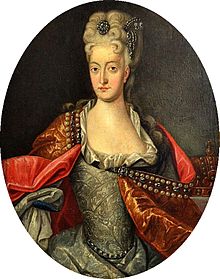 Portrait of Elisabeth Christine of Brunswick-Wolfenbüttel by Johann Gottfried Auerbach (1697–1753) One thing I do love about Vienna is the way the "older" women are treated. Here, a women of 35 is considered a young girl and is treated as young a beautiful! What a relief this would be to many young women in England who are already considered old maids; if only they had been born here instead! In Vienna, I was also encouraged to take a lover, though none of the women are coquettes or prudes. Here it seems that women are respected more based on the rank of their lovers than their husbands. It is quite common knowledge, even an expectation, that a women will take a lover; the ladies here couldn't understand why I would disgrace myself by not having a little intrigue. The women even control their lovers' estate and fortune. A young count even asked me to engage in a little affair of the heart! Obviously I said no, and had this happened in England, I would have been more offended but I spent enough time in Vienna to know that he was simply doing what he was obligated to do. "Gallantry and good breeding are as different in different climates as morality and religion" (66).
Marriage laws in Vienna are quite different from England, not that I know much about these things. Here it seems that dowries are limited to about 2,000 florins (about 200) and whatever money a woman possesses outside of the dowry is hers; her husband can't seize it or control what she does with it. As a result, many women end up wealthier than their husbands! But unfortunately, widows have no place in Vienna as they lose their rank when their husbands die.
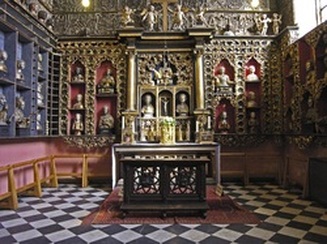 Basilica of St. Ursula's I know that you all expect to hear about the churches and convents. In Cologne, we toured the Basilica of St. Usrula's and it was beautifully decorated with rich images of saints, relics, and tons of pearls, diamonds, and rubies. I have to admit, I even found myself looking quite longingly at St. Ursula's pearl necklace…
In Vienna, I visited the convents, and St. Lawerence's was easily my favorite because of its ease and neatness. It seems much easier to live with than the nastiness and perpetual state of penance at the other convents. I couldn't help but laugh when they showed me a wooden head of our Savior that they swore spoke during the siege of Vienna (they said the open mouth was proof!). Here's a short video of the Chamber of the Bones in St. Ursula's, alleged to contain
the bones of martyred Princess and the 11,000 virgins who were massacred by the Huns (51). After all of this time in Vienna, we spent some time in Prague and Hanover, stopping at Leipzig and Brunswick in between. On the road to Leipzig I swear we almost died, the roads were so dangerous along the River Elbe. Mr. W slept through it all and I, being a good wife, didn't wake him. We barely stopped in Dresden, though I wish we could have stayed longer. The Saxon ladies as so affected, they would think it a mortal sin if they spoke or moved in a natural way.
In Hanover, the women are absolutely beautiful with rosy cheeks, snowy complexions, and coal black hair. The opera house too is much finer than the one in Vienna. We saw the Herrenhausen Gardens which were covered in snow, but still beautiful! There were so many orange trees! A brief video of the gardens We traveled back to Vienna and attended a carnival. Because of the war with the Turks, we weren't allowed to wear the typical carnival masks. We eventually left Vienna and arrived in Gyor, Hungary. For a long time, Gyor was the frontier between the Turkish and German empires. The Turks tried to conquer it many times, sometime successfully, but in the end, the Germans regained control. We continued our travels through beautiful and fruitful plains between Nosmuhl and Buda, but most of the region remains like a desert because of the long war with the Turks and the Emperor. Even worse were the towns of Adam and Fodowar, which are largely forest-like; this part of the country was better off when the Turks ruled. Because it's so little frequented, it was surprising to see the vast number of wild fowl, "which often live here to a good old age and undisturbed by Guns in quiet Sleep."
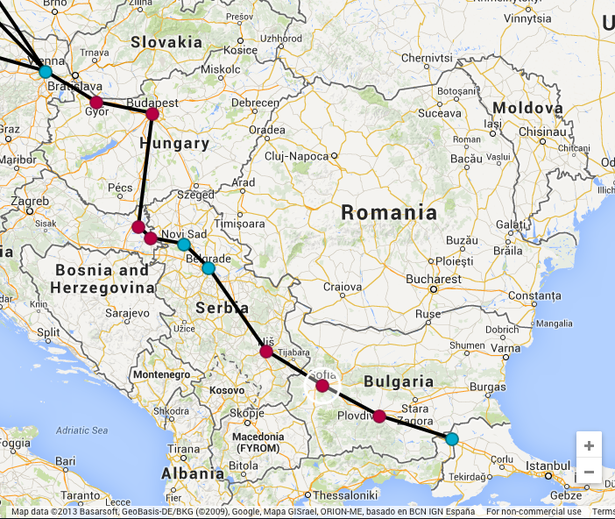 The second half of my journey to Turkey! We took our time and traveled cross-country from Vienna to Belgrade, and soon I'll be in Adrianople! We then passed through Mohatch, Danube, Esseek, and finally Bocowar where we waited until everything was clear concerning our crossing into the Turkish frontier. We were promised by General Bassa Seraskier to be well received in Turkey! We were told that we would be escorted by a Turkish convoy in Betsko, a village between Peterwaradin and Belgrade. When we finally arrived in Betsko, we were met by Turkish soldiers and then made our way to Belgrade. Belgrade is a strong city conquered by the Grand Vizier and strengthened by the numerous garrisons of the bravest soldiers who are commanded by the Bassa. Franky, I did not feel very comfortable here. We were expecting to leave in one night but the Bassa had detained us until he received orders from Adrianople.
Fortunately, we stayed in one of the best houses here and I made friends with our host, Achmet-Beg, whose father was a great Bassa. He dined with us every night and drank wine freely. He was so happy with the liberty of conversing with me; he explained to me some pieces of Arabian poetry, which are generally written in alternate verse, and are rather musical. Their expressions of love were so passionate and lively, and I noticed they were not so different from our own English poetry! I impressed Achmet-Beg by retelling some of the Persian tales that I know. He has such wit and is much more polite than many of our own Christian men back home.
However, these amusements did not hinder me from wanting to leave this place. I'll be leaving Belgrade for Turkey tomorrow. Make sure to follow me here on the blog and my on Twitter @Lady_Mary_WM to stay updated on my adventures in Turkey! *This post references letter 1-25 of The Turkish Embassy Letters, see the full-text here*
|
 Cemetery on the grounds of the
Cemetery on the grounds of the 




 RSS Feed
RSS Feed